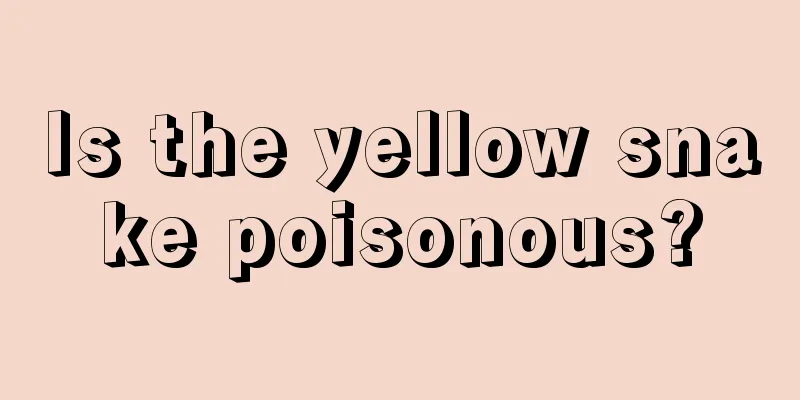Is the yellow snake poisonous?

|
The scientific name of the yellow flower snake is Elaphe dione, which is a common domestic snake in our daily lives. Generally speaking, people have a fear of snakes, and many snakes are poisonous, which poses a great threat to us. The yellow flower snake is large and ferocious, which makes people shudder when they see it. Just like other snakes we encounter, the biggest question people have about the yellow snake is whether it is poisonous. So, is the yellow flower snake poisonous? Let’s take a closer look below. The king elaphe is a species of Colubridae snake. It is large, ferocious, and non-venomous. It will kill each other if it encounters its own kind. It is widely distributed in Henan and southern Shandong (it used to be more common, but is now relatively rare due to the deterioration of the ecological environment and human factors in recent years), Shaanxi, Sichuan, Yunnan, Guizhou, Hubei, Anhui, Jiangsu, Zhejiang, Jiangxi, Hunan, Fujian, Taiwan, Guangdong, Guangxi and other places. Distributed abroad in Vietnam. Lives in plains, hills and mountains. Vertical distribution range: 300~2300mm. Other Chinese common names: stinky king snake, yellow throat snake, yellow jaw snake, king snake (Sichuan), rag snake, yellow python, king python, rape flower, stinky yellow python, ridged rag snake (Heilongjiang), ridged rag snake (Fujian), vegetable snake, Wang character head (Guizhou), cauliflower snake (Hunan, Hubei), pine flower snake (Guizhou, Sichuan), stinky green male and female (Taiwan), cauliflower snake (Jiangsu, Zhejiang, Jiangxi), stinky yellow jaw Protection: This species has been included in the "List of Terrestrial Wildlife with Important Economic and Scientific Research Value under State Protection" issued by the State Forestry Administration of China on August 1, 2000. The main feature of the Elaphe dione is the black pattern in the shape of the Chinese character “王” on its head, hence the name “King Snake”. The scales on its head and back are black with yellow in the center, resembling rape flowers. There are more than 30 yellow horizontal and oblique stripes on the front of the body, which gradually disappear at the back. The belly is yellow with black markings. The tail is slender and can reach a total length of more than 2.5 meters. The color spots on adult snakes and young snakes are very different. There is no "王" shaped pattern on the head, and they are often mistaken for other snake species. I think everyone should have a clear understanding of whether the yellow flower snake is poisonous. The yellow flower snake is not poisonous and is not a venomous snake. Generally speaking, in addition to distinguishing by color, the shape of the head is also an important basis for our judgment. It is advisable to learn more common sense in this area to avoid causing unnecessary panic. |
<<: What are the hazards of gold to the human body
>>: Is the yellow snake poisonous?
Recommend
What are the harms of sleeping too much?
In today's society, many people have problems...
How many years can you usually live after thyroid cancer relapses? What are the factors that affect life expectancy after thyroid cancer relapses?
Thyroid cancer is also called thyroid cancer. The...
What are the dangers of liver cancer? Be careful of the 6 major dangers of liver cancer
Liver cancer is a malignant tumor with a very hig...
What should patients eat before pituitary tumor surgery
Pituitary tumor is a tumor disease that is very h...
Can I get the injection to promote brain nerve development?
Many parents hope that their babies are healthy, ...
Cleaning stainless steel pots with baking soda
Stainless steel tableware has a smooth and beauti...
What harm does drinking too much water do to the human body?
On hot summer days, people usually feel thirsty e...
Can I use a fan after cupping?
In fact, although cupping can effectively relieve...
Will bone cancer recur after resection?
Will bone cancer recur after resection? Some bone...
How to prevent laryngeal cancer
Since laryngeal cancer is a relatively common dis...
How to treat diffuse liver cancer effectively? Introducing the method of local ablation to treat liver cancer
What is the best treatment for diffuse liver canc...
Does frequent intercourse improve sperm quality?
There are many things that couples need to pay at...
How does ovarian cancer metastasize
How does ovarian cancer metastasize? Ovarian canc...
What are the reasons for sudden weight loss
Some people have had this experience, where they ...
What are the sequelae of severe craniocerebral injury?
The health of the brain is something that people ...









